From Lord's to the Lords, Rachael had a pretty impressive innings
She was only eight years old, but Rachael Heyhoe just knew she was going to be in trouble.
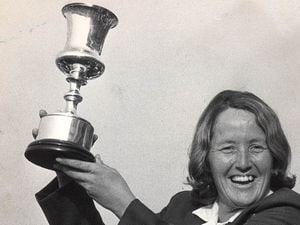
When the local beat bobby spotted her playing an illicit game of cricket on the public highway with a group of young lads, the gang ran for cover, taking up hiding places behind the surrounding trees and hedges.
"The arm of the law yanked us all out one by one, and then out came the black notebook and pencil," she recalled. But what happened next was worse than anything she had been expecting – he let her off for being a girl.
"He took the names and addresses of all the boys, and then went to replace his notebook in his pocket," she wrote in her autobiography.
"This was too much for me. I reached up, tapped him on the shoulder and pointed out that I had been playing cricket too.
"His answer was most pitying: 'Girls don't play cricket,' which was about as devastating blow to my pride as anyone could have delivered."
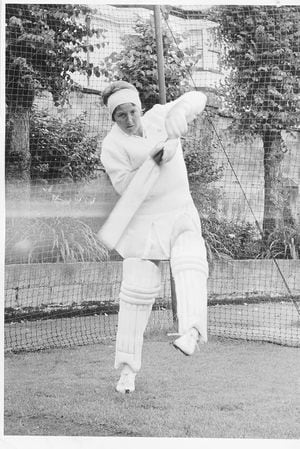
This early brush with the law did nothing to stamp out the menace of street cricket which was blighting suburban Wolverhampton in the late 1940s. But it did reveal a steely, rebellious side to the woman who would blaze a trail for female sports like no-one before her.
"She was, among other achievements, the Dr W G Grace of women's cricket, the pioneer without whom the game would not be what it is," said the Telegraph's celebrated cricket writer Scyld Berry.
Rachael was best known for captaining the England women's team from 1966 to 1977, and was unbeaten in six Test series. She played for the English women's cricket team for 22 years, from 1960 to 1982, and was skipper when her team won the inaugural 1973 Women's World Cup. She was also the first female cricketer to hit a six in a Test match, and one of the first 10 women admitted to the MCC.
And her talents lay beyond cricket. Rachael Heyhoe Flint, as she became known after her marriage to Derrick Flint in 1971, also played as goalkeeper for the England national field hockey team and enjoyed a successful career as a sports journalist, In later life she became vice-president of her beloved football team Wolves, and moved into politics after taking up her seat in the House of Lords.
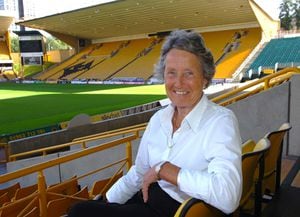
The daughter of two PE teachers, it is little surprise that sport was in her blood. Geoffrey Heyhoe and Roma Crocker had met a college in Denmark, but both settled in the Claregate area of Wolverhampton where Rachael was born on June 11, 1939.
She recalled how as a child she was always more interested in playing sports with her older brother Nicholas than the gentler pursuits normally associated with girls of her generation.
"While the girls of the neighbourhood tended to their dolls and prams, I preferred to play bicycle polo – a fraught, high-speed version of the royal's game – and soccer and cricket with the lads," she said.
After moving to Penn, she attended Woodfield Avenue School where she excelled in sport.
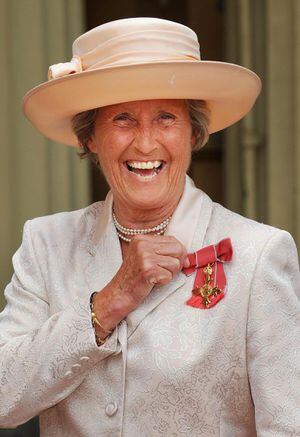
"Rounders and netball introduced me to team games for the first time, and I felt a real desire to be the best and play in the school team, as well as the boys' cricket and football teams," she said.
An early setback, when she fell off an upturned bench on school sports day, led to her spending the evening in floods of tears.
She recalled one Christmas, when she was aged about seven, lying awake waiting for Father Christmas to arrive:
"Eventually a shadowy figure crept into my bedroom and placed a large parcel at the foot of my bed. I hardly waited for 'Santa' to leave the room before leaping out of bed to make the joyful discovery that I had a real leather football. At 3.30 in the morning I pumelled my older brother Nicholas awake and dragged him out on to the lawn for a pre-dawn football match!"
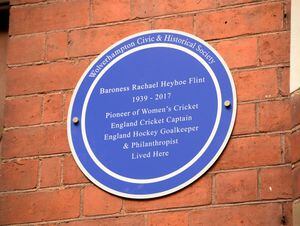
Rachael enjoyed watching her father Geoffrey playing hockey in the winter, and cricket in the summer, always taking a scorebook and pencil with her to record the proceedings.
"It was rumoured I could score a cricket match competently before I could even string a sentence together in a school book," she said.
The real breakthrough came at the age of 11, when she went to watch Geoffrey playing cricket for Wolverhampton Technical College, only to find the team was a man down.
"Amazingly, I soon found myself marked down to bat at No. 11, and had to go out to the crease to stave off defeat," she said.
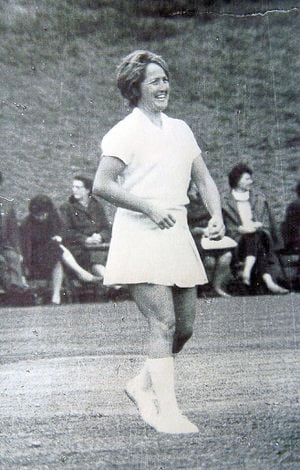
"The pads reached my waist and the bat felt like a tree trunk, but the men were kind enough to bowl me a few slowish half-volleys, and to everyone's surprise I managed to score two or three undefeated runs and save the game."
Despite showing little interest in academic matters, she passed the 11-plus and secured a place at Wolverhampton Girls' High School, where cricket and hockey player Mary Greenhalgh became a PE teacher.
"In the summer of 1954, she took a somewhat rebellious school party to the Edgbaston Test ground to watch the Midland women's team play the touring New Zealanders," said Rachael.
"This was euphoria for me. Not only were we missing school lessons to watch cricket, but it was women's cricket, played at a very high standard.
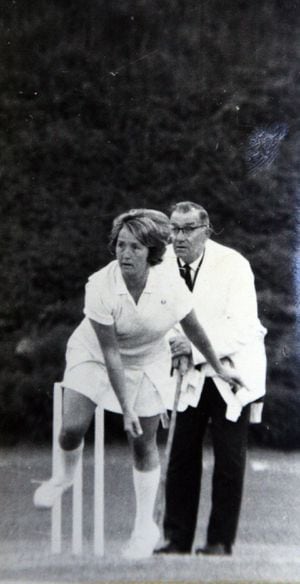
"As I studied the game at Edgbaston, I made up my mind that this was the life for me. I came away with an image of an exciting, challenging life, travelling the world playing cricket, meeting people. It seemed everything I wanted out of life and I think it was there and then that I determined I must play cricket for England women – though if the truth were known, I wasn't even sure whether England had a women's cricket team."
As it turned out, Rachael was one of three girls from her school who went on to play for England, the others being Jackie Elledge and Ann Jago, known as "Sago" to her friends.
After leaving school, Rachael went to the College of Physical Education in Dartford, but failed her final exams after spending too much time playing hockey and cricket and not enough time studying. She qualified with a teaching diploma after resits and had the last laugh almost 40 years later when the same establishment – now the University of Greenwich – gave her an honorary degree to add to those also received from the universities of Leeds Metropolitan, Bradford and Wolverhampton.
Chiefly a right-handed batsmen – although occasionally also turning out as a leg-spin bowler – she played in 22 Women's Test cricket matches from 1960 to 1979, with a batting average of 45.54 in 38 innings. She took three Test wickets and scored three Test centuries. She also played in 23 Women's One-Day Internationals, with a batting average of 58.45 and a top score of 114.
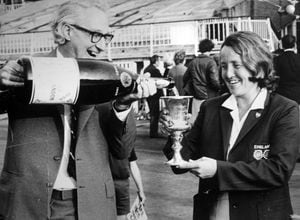
But in an era when the world of cricket was still getting to grips with men earning a living from the sport, this was never going to be anything more than an "expensive hobby" for Rachael. After leaving college in 1960, she worked as a PE teacher at Wolverhampton Municipal Grammar School, and later at Northicote School, which conveniently allowed her to play for England during the school holidays.
After falling out of love with teaching, she took up a post as a clerical assistant in the promotions department of the Express & Star. The departure of the sports editor on the Wolverhampton Chronicle gave her an opening to cover Wolves matches for the paper, although in those days the club would not allow a woman in the press box.
When her secondment on the Chronicle came to an end, she did a stint as a sub-editor on the Express & Star sports desk, and in 1972 she became the first female presenter on ITV's World of Sport. The year before she had moved to Wergs Road, Tettenhall, where she would remain for the rest of her life, after marrying civil engineer Derrick Flint. Derrick had played 10 first-class games for Warwickshire in 1948-49.
Never lacking in confidence, she wrote to prominent Wolverhampton-born businessman and philanthropist Sir Charles Hayward in 1970, asking him to sponsor England women's cricket tour of the West Indies.
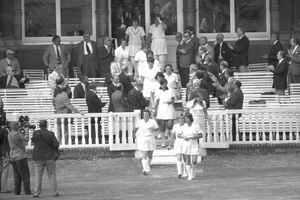
“He had no interest whatsoever in sport and put my letter in the waste paper basket," she said. But the same afternoon his son Jack visited from his home in the Bahamas, and Sir Charles' secretary handed him a crumpled bit of paper saying "Here is a letter from a funny woman who plays cricket for England and wants sponsorship to send a team to the West Indies".
He agreed to sponsor the team for five years, and in 1973 he financed the first Women's Cricket World Cup – pre-dating the men's competition by two years.
But while her ability on the pitch was never in question, and neither was her talent for raising the profile of the women's game, Rachael's brash, extrovert personality was beginning to grate with some of the more staid elements within the Women's Cricket Association. While she loved fast cars, was partial to the odd glass of lager, and made regular appearances on television, this was an anathema to some of the more traditional 'ladies' at the top of the sport.
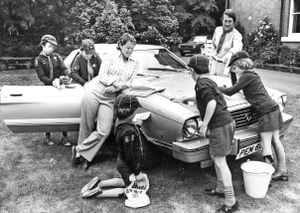
The finest innings of her career came at the Oval in 1976, when she sent records tumbling by scoring an unprecedented 179 not-out against Australia. Batting for more than eight-and-a-half hours, she saved the Ashes series by snatching an unlikely draw. But, in her view at least, it also marked the beginning of the end for her time as England captain.
"As I came off, mentally and physically exhausted from the strain, the relief I felt was incredible," she wrote in her autobiography.
"I dragged myself up the steps and found Derrick waiting for me at the top. I kissed him and gratefully accepted a glass of beer. It seemed the most natural thing in the world to me, but official eyes, viewing the incident, did not approve."
By this time, she believed she had firmly built up a reputation as the enfant terrible of the Women's Cricket Association. A joke about taking the MCC to the Equal Opportunities Commission unless the women's team was allowed to play at Lord's had not gone down well, and a letter she wrote to the Daily Telegraph criticising sports minister Dennis Howell had earned her a formal reprimand.
During the 1976 Ashes series, her son Benjamin was taken ill just before the Edgbaston Test, and she spent a night at home with him in Wolverhampton when she should have stayed at the team hotel in Birmingham.
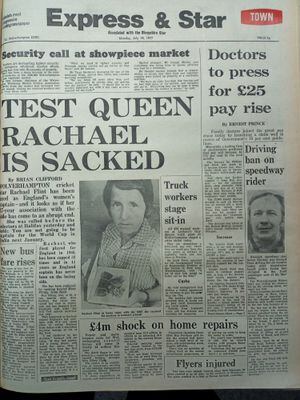
The end of her spell as captain came in July 1977, when she was summoned to a meeting with selectors at Halifax cricket ground, and chairman Audrey Winterbottom announced that she would not be in charge of the team for the Christmas tour of India. Her dismissal sparked something of a media storm, thrusting women's cricket into the spotlight as never seen before.
Rachael continued to play cricket for the West Midlands club side until 1985, and after her retirement carved a successful career as a broadcaster and after-dinner speaker. She became a founder member of the Lady Taverners in 1980 – an organisation hurriedly thrown together when the election of Margaret Thatcher created a problem for the all-male Lord's Taverners, which had traditionally invited the prime minister of the day to become an honorary member.
She served 10 years as president of the charity from 2000 to 2010, raising £1 million. One of her proudest moments came in 2009, when she presented the Birch Thompson Trust – which provides low-cost holidays for children in Wolverhampton – with a minibus, funded by money raised at her 70th birthday party.
Rachael became one of the first female directors of a professional football club when her old friend Sir Jack Hayward invited her to join the Wolves board in 1997 – although by this time Karren Brady had been in charge of neighbouring Birmingham City for four years.
She had been made an MBE in 1972, and an OBE in 2008, and had also served as a deputy lieutenant of the West Midlands. But the icing on the cake came in November 2010 when it was announced she was to be appointed to the House of Lords where she would sit as a Conservative Party peer.
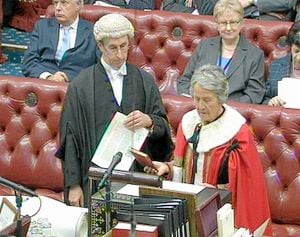
"I will certainly look forward to the commute from one Lord's to another Lords," she joked at the time.
She remained a proud Wulfrunian up until her death, having resisted calls that a move to London would help her media career and charity work.
"I would not say that I never want to be anywhere else – there are moments when I would not mind being in the sunshine in Australia and I love the scenery in the Lake District and Shropshire for example," she said. "But, no, Wolverhampton is the place for me."
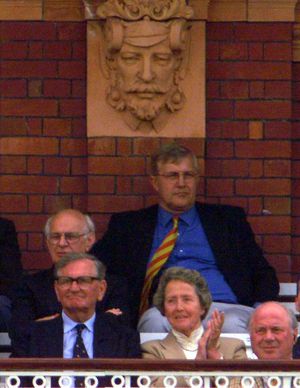
Rachael was patron of a number of charities in the city, including Radio Wulfrun Hospital Broadcasting, Wolverhampton Multi-Care that offered respite to the parents and families of severely disabled youngsters, and Westcroft Sports College and Paycare, which provided a special lounge for disabled Wolves fans at Molineux.
She was one of the first honorary female life members of the MCC, among the first two women to be appointed to the England and Wales Cricket Board, and was the first woman to be inducted into the International Cricket Council’s Hall of Fame in Bangalore.
Rachael died on January 18, 2017, aged 77, after a short illness.
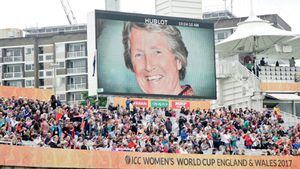
The guest list for her funeral, at St Peter's Church, Wolverhampton, read like a Who's Who of sport and showbusiness; attendees included lyricist Sir Tim Rice, football legend Sir Trevor Brooking, Olympic gold medallist Denise Lewis, former England cricket captain Mike Gatting and broadcasters Judith Chalmers, Suzi Perry and Jacqui Oatley. Angela Rippon gave an emotional eulogy, saying that Rachael had ‘stolen our hearts’, while Jody Craddock, Steve Bull, Danny Baath and Don Goodman represented her favourite football club, along with then-manager Paul Lambert, former chairman Steve Morgan and ex-chief executive Jez Moxey.
All in all, it wasn't a bad innings.
Fascinating facts about Rachael Heyhoe Flint
Born in Claregate, Wolverhampton, June 11, 1939, the daughter of Geoffrey and Roma Heyhoe.
In December 1960, she made her England Test debut against South Africa, just months after starting work as a PE teacher at Wolverhampton Municipal Grammar School, now the Newhampton Arts Centre.
She hit the first six in a women's Test match in 1963, at the Oval against Australia.
In 1965 she became a temporary sports writer for the Wolverhampton Chronicle, later securing a permanent post on the sportsdesk of the Express & Star. She became the first female anchor on ITV's World of Sport in 1972, a role she held for six years.
In 1970 she persuaded Jack Hayward, son of wealthy Wolverhampton philanthropist Sir Charles Hayward, to fund an England women's cricket tour of the West Indies.
She married Derrick Flint in 1971, and moved to Tettenhall where she lived with Derrick's four children from a previous marriage. They had a son Benjamin in 1974.
She led England to victory in the inaugural Women's Cricket World Cup in 1973, receiving the trophy from Princess Anne at Edgbaston. The tournament had been financed by Jack Hayward.
Heyhoe Flint captained the first England women's team to play at Lord's in a One Day International v Australia in 1976. During the Ashes series of the same year, she scored a then Test record 179 not out at The Oval, saving the series by securing a draw. But during the same series she was issued with a formal reprimand for allowing her son in the ground and not spending the night at the team hotel.
She was dismissed as England captain by the Women's Cricket Association selection committee on July 17, 1977, and dropped from the Test team shortly after.
She continued to play for the England ODI team until 1982, her last game being the World Cup Final on February 7 – a three-wicket defeat to Australia.
Heyhoe Flint retired from club cricket in 1985,
She was appointed an MBE in 1971, and an OBE in 2008. In November 2010 she was appointed Baroness Heyhoe Flint of Wolverhampton.
She died on January 18, 2017, aged 77.





